How We Do It: The Talk Flock – Taking Care of Caregivers
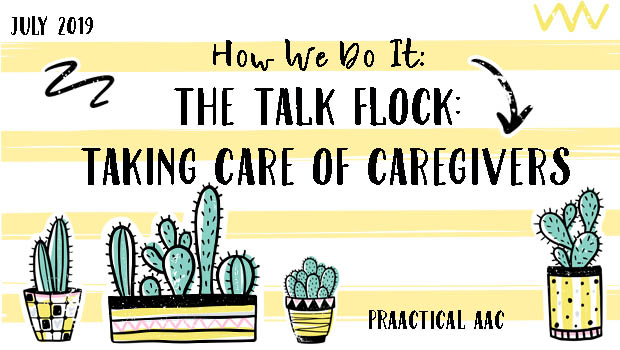
How can we better support parents and caregivers of children with AAC needs? 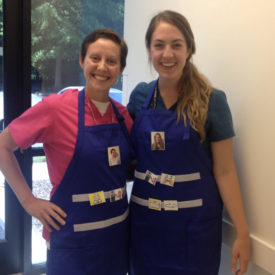 Meredith Laverdure and Jaime Lawson, who are SLPs and former co-workers, wanted to do more for the families they served. Meredith is currently a doctoral student at Old Dominion University. Her clinical and research interests include building communicative competence for children with complex communication needs with group interventions, as well as family- and community-level support. Jaime has predominately worked with pediatric clients, focusing on AAC/AT evaluations and intervention. Her clinical and research interests include enhancing communicative opportunities for children across settings and in various social settings, group intervention, family-centered therapy, and communication partner training.
Meredith Laverdure and Jaime Lawson, who are SLPs and former co-workers, wanted to do more for the families they served. Meredith is currently a doctoral student at Old Dominion University. Her clinical and research interests include building communicative competence for children with complex communication needs with group interventions, as well as family- and community-level support. Jaime has predominately worked with pediatric clients, focusing on AAC/AT evaluations and intervention. Her clinical and research interests include enhancing communicative opportunities for children across settings and in various social settings, group intervention, family-centered therapy, and communication partner training.
In this post, Meredith and Jaime share their experiences in developing The Talk Flock, a parent education and support group.
Enjoy!
The Talk Flock: Taking Care of Caregivers
As speech-language pathologists in the outpatient pediatric setting with a busy AAC/AT clinic, we tried to do all the right things and make the right choices. We were tirelessly looking at research, brainstorming activities, going to conferences, and implementing AAC strategies during therapy sessions with clients with complex communication needs. We’re sure you all have been through the same thing! We even started an AAC group with multiple children using various AAC modalities. It was during this time that we accidentally stumbled upon a missing link. In our attempts to build communicative competence, it seems we had forgotten that our clients are a big part of dynamic and complex family systems! So, we needed to investigate how to best support the whole family, not just the client listed on our caseload. We needed to find out what causes extra stress for caregivers of children with complex communication needs and how to best to address the stressors within our professional scope of practice.
Here’s what we found –
- Parents are stressed out! Caregivers experience stress and anxiety and worsening of overall health (Murphy, Christian, Caplin, & Young, 2007).
- The child’s level of functioning is not the best predictor of the parents’ stress. However, family resources are better predictors of parenting stress (Smith, Oliver, & Innocenti, 2001).
- Barriers to AAC use impact caregiver stress! The time demand for programming, the responsibility of being a constant instructor, expecting immediate benefits, and coordinating between settings all lead to more stress for caregivers (Bailey, Parette, Stoner, Angell, & Carroll, 2006).
Because of these reasons, we started The Talk Flock (we know, don’t be too jealous of the name)! The Talk Flock is a monthly, 1.5-hour meeting, held after work hours. Clients that currently participate or have previously participated in our the AAC group are invited, as well as their parents, siblings, friends, and other therapists. The key is that we do not provide a billable therapeutic service. During The Talk Flock, we provide some interactive activities and ideas for discussion. Usually, caregivers take over from there! We have celebrated birthdays, talent shows, Olympic Games, and holidays. We often use a variety of AAC modalities to communicate during The Talk Flock! Parents new to an AAC journey can speak to seasoned parents. Therapists with less familiarity with AAC interact to learn new techniques. Siblings see other children with AAC systems!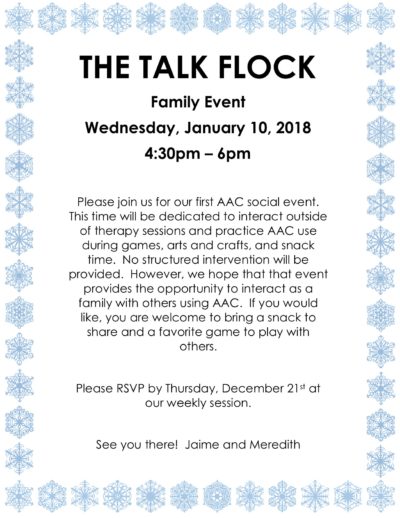
As therapists, the measurable outcome is great. Caregiver beliefs impact social participation, which is so important to build communicative competence outside of the therapy room (Clarke et al., 2011). However, our own data collection during therapy is not the only benefit. Individuals who use AAC to functionally communicate are often not consistently exposed to modeling and social communication opportunities (Van Tatenhove, 2016) and lack inclusion in social exchanges, resulting in decreased social interaction limiting the 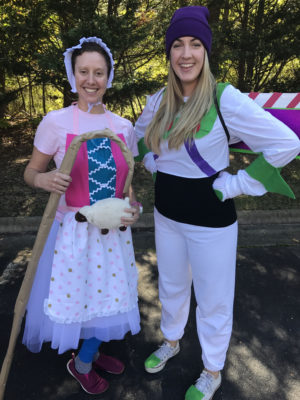 development of meaningful relationships (Thiemann-Bourque, 2012). The Talk Flock is a growing community of children, families, friends, and therapists. It is used to increase peer support, promote participation, model aided language stimulation, troubleshoot technical problems, and brainstorm solutions to everyday problems. It is a stress-free, free-flowing, and flexible opportunity for caregivers to practice and learn in a safe, trusting setting. Caregivers are able to gain ideas and feedback from others on how to model language and interact with their child using AAC. They can ‘mess up’ and not feel judged by those participating in The Talk Flock group.
development of meaningful relationships (Thiemann-Bourque, 2012). The Talk Flock is a growing community of children, families, friends, and therapists. It is used to increase peer support, promote participation, model aided language stimulation, troubleshoot technical problems, and brainstorm solutions to everyday problems. It is a stress-free, free-flowing, and flexible opportunity for caregivers to practice and learn in a safe, trusting setting. Caregivers are able to gain ideas and feedback from others on how to model language and interact with their child using AAC. They can ‘mess up’ and not feel judged by those participating in The Talk Flock group.
We focus a lot of our energy during The Talk Flock on speaking with caregivers. Caregivers are critical, lifelong communication partners (Wagner, Daswick, & Musselwhite, 2003) and often report feeling overwhelmed by demands related to communication (Goldbart & Marshall, 2004). To address this, we have The Talk Flock meeting for caregivers only about once per year. During this time, we encourage parents to participate in a very honest discussion about the AAC process, from initial AAC evaluation, through training, treatment, to current, as well as different settings involved in their child’s care. We discuss strengths, weaknesses, opportunities, and threats.
With this information, we act! We improve processes and learn how to best support families as reported by caregivers. We refine our own skills as clinicians to not only serve the client but the entire family. We remind ourselves that our 1:1 time with that child is just one very small piece of the pie of that family’s life and therefore, need to remember our role as cheerleaders and advocates!
Selected References:
- Bailey, R.L., Parette, H.P. Jr., Stoner, J.B., Angell, M.E., & Carroll, K. (2006). Family members’ perceptions of augmentative and alternative communication device use. Language, Speech, and Hearing Services in Schools, 37(1), 50-60.
- Clarke, M.T., Newton, C. Griffiths, T., Price, K., Lysley, A., & Petrides, K.V. (2011). Factors associated with the participation of children with complex communication needs. Research in Developmental Disabilities, 32(2), 774-780.
- Goldbart, J. & Marshall, J. (2004). “Pushes and pulls” on the parents of children who use AAC. Augmentative and Alternative Communication, 20(4), 194-208.
- Murphy, N.A., Christian, B., Caplin, D.A. & Young, P.C. (2007). The health of caregivers for children with disabilities: A caregiver perspective. Child: Care, Health, and Development, 33(2), 180-187.
- Smith, T.B., Oliver, M.N., & Innocenti, M.S. (2001). Parenting stress in families of children with disabilities. American Journal of Orthopsychiatry, 71(2), 257-261.
- Thiemann-Bourque, K. (2012, December). Peer-mediated AAC instruction for young children with Autism and other developmental disabilities. Perspectives on Augmentative and Alternative Communication, 21(4), 157-164.
- Van Tatenhove, G.M. (2016, November). Normal language acquisition & children using AAC systems. Retrieved from http://www.vantatenhove.com/files/papers/Common/NLD&AAC.doc
- Wagner, D., Daswick K., & Musselwhite, C. (2003). Out and About: AAC in the community. Retrieved from http://aacintervention.com/home/180009852/180009852/tips/2003/10oct2003/Out%20%26%20About%20Handout.pdf
Filed under: Featured Posts, PrAACtical Thinking
Tagged With: AAC partner training, caregivers, parent training
This post was written by Carole Zangari

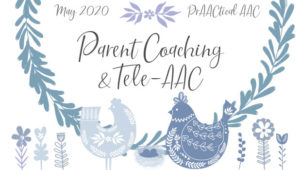
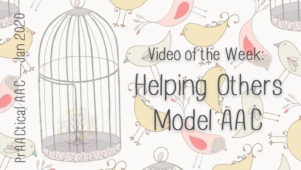
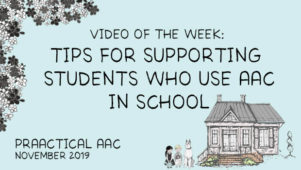
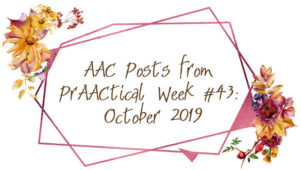
2 Comments
I love this idea! I spend LOTS of time after work hours on the phone with parents so this would actually take LESS time that what I’m doing now. And it sounds like much more fun. Would you have any issues with a few of us in Roanoke starting something like this? I have a few colleagues who would probably do this with me.
Hi, Mary Kay! Thank you for your feedback…we have definitely found the Talk Flock family event to be highly beneficial in connecting further with patients, their families, and other service providers. Having it presented in a casual and flexible setting alleviates a lot of the stress and does make it a lot of fun! Meredith and I would definitely support you starting your own family event in Roanoke. We are available for e-mail correspondence, as well, to share ideas and to further collaborate.
Thanks!
Jaime